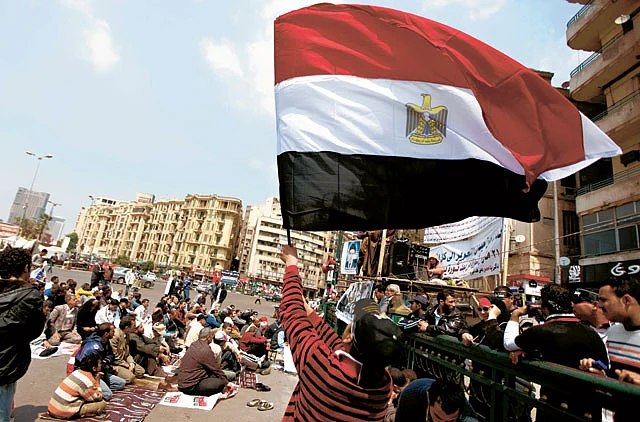Cairo: The ragged effigy of a fallen leader dangles from a lamppost over the remnants of a dying revolution. Those left from the uprising that swelled through Tahrir Square last year and brought down Hosni Mubarak live in tents, harassed and cursed, but mostly forgotten.
"None of those in power have made good on the revolution," says Ragab Radwan, peeking from a dirty tent in the middle of the square. "How can I leave? I have to stay here for my country and for a better life for my son."
"Egyptians are tired. They've lost hope. They think our protest is useless," says Ahmad Shahawy, dressed in a green suit with no belt and scuffed shoes, but determined to strike a gentleman's pose. "The state media has done a wonderful job in painting us as a bunch of people out of touch."
Some in this strange, small menagerie in the centre of the Egyptian capital are outcasts. Young men pass a hash pipe, looking numb. Homeless boys wander like understudy revolutionaries and men with distant stares sit amid lean-tos of blankets and plastic fastened to the dirt. They yelp diatribes and look for followers; a brisk wind off the Nile could blow them away.
"The protests should end and if these people have complaints, they should take them to parliament. That's where things are settled these days, not in Tahrir," says Ebrahim Abu Oma, a heavyset man who owns a luggage shop in the square.
No victories
"I lost 80 per cent of my business in the last year. I'm hoping things pick up soon. Tahrir will always be the most important part of this country. I'm honoured to work here."
The square is where the nation reclaimed its dignity, but for some it has turned into a symbol of vows broken. That's why, they say, most people hurry past, not wanting to be reminded of what Tahrir has come to mean. There have been victories.
A new legislature has been sworn in; a presidential election is scheduled for May. Mubarak and his sons are in jail. But the military remains in power, civil rights are stalled and a fight over a new constitution between Islamists and secularists threatens to imperil democracy.
Streets leading to parliament are barricaded, and Cairo can feel as if it's bracing for another spasm of unrest. The graffiti just off the square catch the eye: scenes depicting ancient Egypt, a towering rebel holding a gun next to the words ‘A man is a man'.
They bloom with colour and seem alive, tiny patriotic narratives and martyrs painted with angel wings. Some expressions, though, are not so beautiful. A small black-and-white photograph of a boy pasted to a street light reads: ‘Salem Mohammad Mustafa is lost. Whoever finds him please call ..."
Radwan has watched lost children saunter past. A car mechanic, he's been camped here for months, letting a friend run his shop as he attempts to enlist members in his budding Popular Nasserist Party, which fights injustices, real and imagined.
He says he knows how he and his dishevelled band are perceived, but doesn't care. "The square will not allow us to forget all those who died and what they died for," he says.
Rebels, in the minds of many, have turned into troublemakers. They are sometimes chased by shopkeepers and beaten by thugs. "The military has done a great job of dividing Egyptians," Shahawy says. "They keep us divided while we line up for gas and bread and the people in power safeguard their own interests."
Business as usual
The protesters disappear toward Mubarak's former ruling party headquarters, now a charred husk of broken windows looming over the square. Next door, workers renovate the Ritz-Carlton, not far from vendors selling Dr Seuss hats and handing out posters of an Islamic candidate who believes that only the harsh interpretation of Sharia can save the country.
"We don't have justice yet and, really, we don't know if we'll ever have justice," says Magdy Hawa, a man of many talents: musician, actor and occasional circus ringmaster. He lifts his ankle to show a milky white scar.
"My two sons came here to the revolution last year and I was worried about them so I came too," he says as Radwan and Shahawy shake their heads. "I was shot twice. I was never compensated."
Dressed in a black tunic and rust-colored robe, Hawa clears his throat and describes the plot of a famous play, The Chaotic. "It's about a disillusioned man who goes searching for the truths of life," he says. "But once he thinks he's discovered one, someone tells him, ‘No, that's not a truth.' He keeps looking and searching but every time he's told the same thing. That he's wrong. This is Egypt, right now."
The traffic thickens, the tents seem overwhelmed. Passing shoppers, students and workers outnumber protesters by ratios too high to ponder. Radwan, Shahawy and Hawa trade cigarettes, watching life go by while keeping vigil over all that is unfinished.
— Los Angeles Times
Sign up for the Daily Briefing
Get the latest news and updates straight to your inbox
Network Links
GN StoreDownload our app
© Al Nisr Publishing LLC 2026. All rights reserved.
